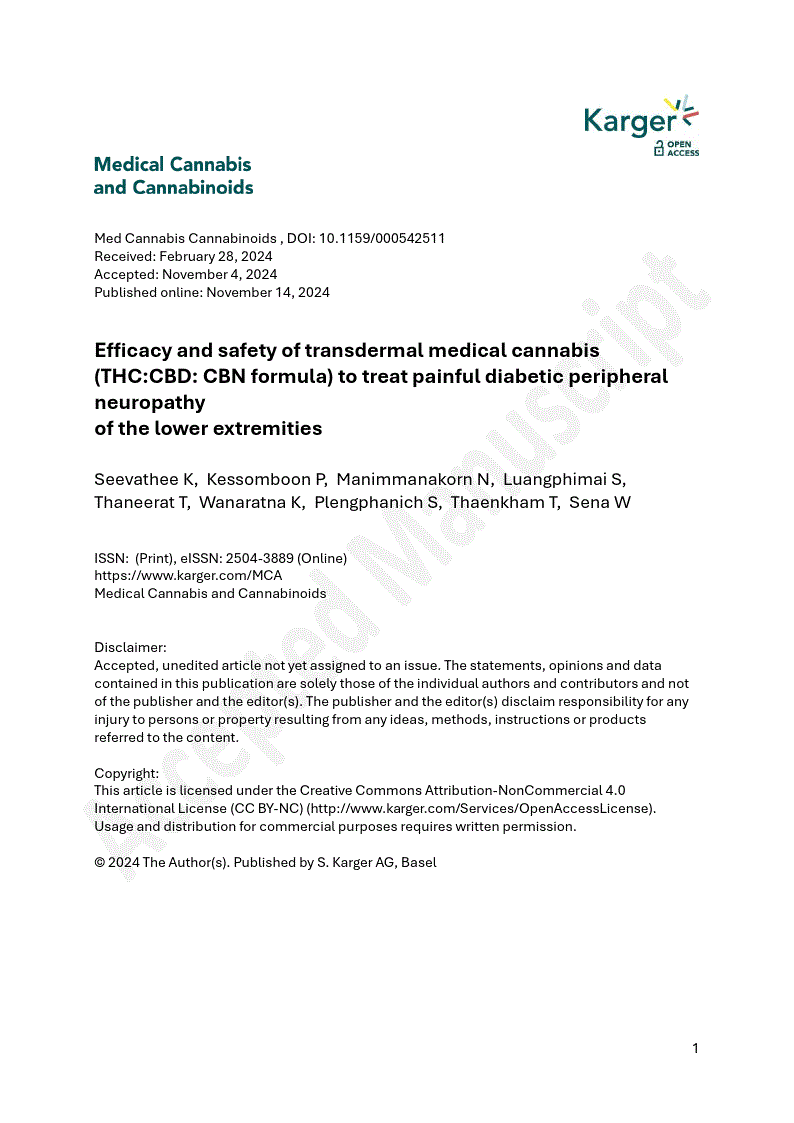Why Taos Kush Institute Drs. Roulet Research Articles| November 14 2024 Efficacy and safety of transdermal medical cannabis (THC:CBD: CBN formula) to treat painful diabetic peripheral neuropathy of the lower extremities
Subject Area: General Medicine , Pharmacology , Public Health
Med Cannabis Cannabinoids 1–24.
https://doi.org/10.1159/000542511
Article PDF first page preview

Abstract
Introduction: Diabetic peripheral neuropathy (DPN) represents a prevalent neurological complication affecting millions of patients globally. This clinical investigation evaluated the therapeutic efficacy and safety profile of a novel transdermal medical cannabis formulation (THC:CBD:CBN) in treating painful DPN of the lower extremities. Methods: This phase III, double-blind, placebo-controlled, randomized clinical trial was conducted at Don Chan Hospital, Thailand, enrolling 100 participants over a 12-week intervention period. Using a computer-generated randomization sequence, participants were allocated to receive either the standardized cannabis formulation or a matched placebo. The primary outcome measure comprised pain intensity assessment using the validated Thai version of the Neuropathic Pain Symptom Inventory (NPSI-T). Secondary outcomes encompassed treatment-emergent adverse events and dermatological manifestations. Statistical analyses were performed using SPSS Version 28.0, incorporating Generalized Estimating Equation (GEE) modeling and Analysis of Covariance (ANCOVA). The study protocol received approval from the Institutional Review Board of Khon Kaen University and the Kalasin Provincial Public Health Office Ethics Committee, with trial registration in the Thai Clinical Trials Registry. Results: The intervention group demonstrated statistically significant reductions in NPSI-T scores across all measured dimensions (p<0.001). Mean total NPSI-T scores decreased markedly from 25.60 to 5.57 in the treatment cohort, contrasting with minimal reduction from 25.24 to 22.85 in the placebo group. GEE analysis revealed significant pain amelioration at weeks 4, 8, and 12 (p<0.001). The cannabis formulation exhibited an excellent safety profile, with only 10% of participants reporting mild adverse events, comparable to placebo group outcomes. Conclusion: This novel transdermal medical cannabis formulation (THC:CBD:CBN) demonstrated significant therapeutic efficacy in ameliorating painful DPN symptoms while maintaining a favorable safety profile. These findings provide robust clinical evidence supporting its potential as an innovative therapeutic option for managing painful diabetic peripheral neuropathy.

Comments